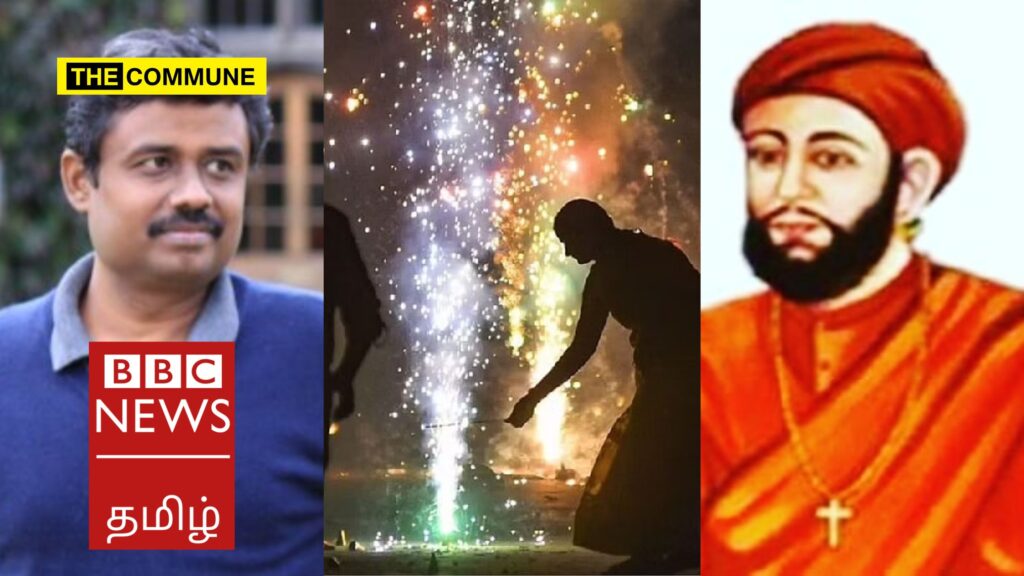In an attempt to alienate the Deepavali festival from Tamil culture, serving evangelist propaganda, a BBC Tamil journalist quoted an Italian missionary to claim “Deepavali is not a Tamil festival”.
Muralitharan, a BBC Tamil journalist, had written an elaborate article trying to prove that there is no evidence of the Deepavali festival in Tamil literature until the 19th century.
He had quoted the works of Veeramamunivar to buttress his claims.
However, the real name of the “Veeramamunivar” is Constantine Joseph Beschi, an Italian Jesuit Priest and South Indian missionary.
Muralitharan quoting the Italian missionary wrote “The word ‘Deepavali’ is not found in ‘Sathuragarathi’ written by Veeramamunivar in 1732. Similarly, the term ‘Deepavali’ does not appear in Tamil literature until the nineteenth century.”
By quoting Manippai’s Tamil to Tamil dictionary, released in Sri Lanka in 1842, he mentioned that the word “Deepavali” appeared in Tamil literature for the first time and that the festival may have been introduced into Tamil Nadu at that time.
He added, “According to Tamil tradition, all our festivals are celebrated in the post-harvest period. Po.Velsamy says this festival may have become popular in the 19th and early 20th centuries. He also said U.V. Saminathaiyar’s biographical book, En Sarithram, has nothing much to say about Deepavali.”
He also tried to give a spin that Deepavali may be a Jain festival, following the standard template of Dravidian Stockists and Christian missionaries who ascribe anything and everything good to Jainism which had a considerable influence among the Tamil populace back in the day.
He quoted Seeni Venkatasamy, who said, “While staying in the king’s palace, Vardhamana Mahavira, the last Tirthankara of Jainism, delivered a sermon to the people of Bhavapuri. The sermon lasted all night and ended at dawn. As a result, people slept wherever they could without going home. In his seat, Mahavira attained Moksha as well. Deepavali is celebrated at dawn because Mahavira attained Moksha at dawn. Following the decline of Jainism, many Jains converted to Hinduism and continued to celebrate Deepavali.”
“Tho Paramasivan also claims that there is no Deepavali festival in ancient Tamil Nadu,” he continued. This is discussed in his book ‘Festivals in Socio-Historical Perspective.’ “The general period of Tamil Nadu festivals is from the Tamil month of Thai to the month of Adi,” said Paramasivan. Tamil Nadu is in the tropics. As a result, the festival season in Tamil Nadu is when there is no agricultural work. During this time, Tamil Nadu’s local deities are celebrated.
Deepavali, a popular festival today, was introduced to Tamil Nadu by Telugu Brahmins during the reign of the Vijayanagara kings. In North India, Deepavali is festival of Jains,” he added.
He went on to say that Ayodhidaasar claimed Deepavali was a Buddhist festival that was stolen by Brahmins.
“But when most people celebrate a festival with joy, it is better to leave the research of where it came from and whether we should celebrate it and celebrate it if we want to,” he concluded, quoting Sivasubramaniam, a researcher of local deities.
"தமிழ் வரலாற்றில் 19ஆம் நூற்றாண்டுவரை தீபாவளி குறித்த குறிப்புகள் ஏதும் கிடையாது. வீரமாமுனிவரின் சதுரகராதி 1732ல் வெளியிடப்பட்டது அதில் தீபாவளி என்ற சொல் கிடையாது. தமிழ் இலக்கியங்களிலும் 19ஆம் நூற்றாண்டுவரை தீபாவளி என்ற சொல் ஏதும் கிடையாது. (1/10) pic.twitter.com/iiimvz2yxl
— Muralitharan K (@muralijourno) October 24, 2022
Click here to subscribe to The Commune on Telegram and get the best stories of the day delivered to you personally.

